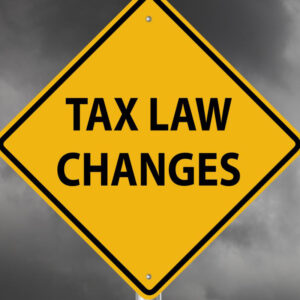Tax Partner
The 2017 Tax Cuts and Jobs Act was passed under the tax neutral reconciliation rules and included a significant amount of tax law changes that begin to adjust this year. Here are the details as follows:
2022 Tax Year Changes
- Research and Development costs
- Through 2021 research and development costs could be immediately deducted for tax purposes but starting in 2022 are now required to be capitalized and amortized over five years for research conducted within the United States or fifteen years for research conducted outside of the United States.
- Research and development costs are defined as direct expenditures relating to a company’s efforts to develop, design, and enhance its products, services, technologies, or processes.
- Legislation to delay implementation until 2026 has been introduced but stalled in the senate and with the upcoming elections we may not receive any current relief or the relief may be attached to a tax extender bill towards the end of the year.
- We recommend business owners analyze their research and development expenditures to determine the impact to their taxable income.
- Interest Expense limitation
- Through 2021 the interest expense limitation allowed addbacks for depreciation and amortization to determine if and how much of the limitation applies. Starting in 2022 you can no longer addback depreciation and amortization.
- Please note the interest expense limitation only applies to businesses with average gross receipts greater than 27M and all companies that are considered tax shelters.
- A tax shelter is defined as a passthrough entity such as an S corporation or Partnership that allocates more than 35% of their annual losses to limited partners who do not actively participate in the management of those entities.
- Certain real property trades or businesses can elect out of the rules but will lose their ability to deduct tax bonus depreciation on real property improvements.
- For example, a business with $1M taxable income after $500,000 depreciation and $450,000 interest expense would be limited in 2021 versus 2022 are as follows:
- In 2021 the interest limitation would be the 1M taxable income plus the $500K depreciation addback for 1.5M X 30% limitation percentage which equals a $450,000 limit which will cover the $450,000 interest expense resulting in no limitation.
- In 2022 we no longer can addback the $500,000 depreciation resulting in 1M taxable income X 30% limitation percentage which equals a $300,000 limit resulting in $150,000 interest limitation which will be included in taxable income.
2023 Tax Year Changes
- Federal tax bonus depreciation
- In 2023 the 100% federal tax bonus depreciation will phase down to 80% with an additional 20% decline each subsequent year resulting in potential delayed tax deductions of personal property purchases.
- Businesses will need to consider whether they can qualify for the section 179 expense instead when applicable.
2026 Tax Year Changes
- Individual tax law changes
- In 2026 the majority of the individual tax law changes will revert back to the 2016 tax laws, some of the major changes are as follows:
- Individual maximum tax rates increase from the current 37% to 39.6% and the rate brackets will adjust pushing a lot of taxpayers into higher rates.
- The passthrough businesses 20% deduction will be going away.
- The state and local tax annual 10,000 limit will expire.
- The estate tax exclusion will be cut in half from around 12M to 6M.
- The sunsets are many years out and there will likely be introduced legislation to extend these popular tax benefits.
- In 2026 the majority of the individual tax law changes will revert back to the 2016 tax laws, some of the major changes are as follows:
Regarding the state and local tax annual 10,000 limit, in 2021 California and many states enacted laws to bypass the limitation for qualifying owners of passthrough entities that meet certain requirements by electing to pay the California withholding tax at the entity level. However, in order to elect in for 2022 the entity would have needed to pay the greater of $1,000 or 50% of the 2021 withholding tax amount by June 15, 2022. The election will continue to be available until the state and local tax $10,000 cap expires in 2025. Please see the following article for additional information https://www.cpa-wfy.com/top-considerations-for-june-15-ca-passthrough-payment-deadline/.
With all the upcoming changes, business owners should also keep in mind the often overlooked small business tax benefits that became permanent law in 2017. One of the most popular for small businesses with average gross receipts less than 27M is the ability to convert from the accrual method to cash method of accounting for tax purposes and the ability to write off inventory when purchased instead of when sold to help delay when taxes are owed to when revenues are collected and allow tax deductions when inventory is purchased. We have worked with many businesses helping them save millions in taxes by implementing these small business tax favored strategies.
Contact a tax advisor here at WFY to discuss additional details regarding these tax law sunset changes, or sign-up for our newsletter here to receive more updates.
Wright Ford Young & Co. is headquartered in Irvine, CA and is the largest single office CPA firm in Orange County. WFY is a full service corporate accounting firm offering audit, tax, estate and trust, and business consulting services to closely held company and family business owners. More information about our Firm can be found at www.cpa-wfy.com

